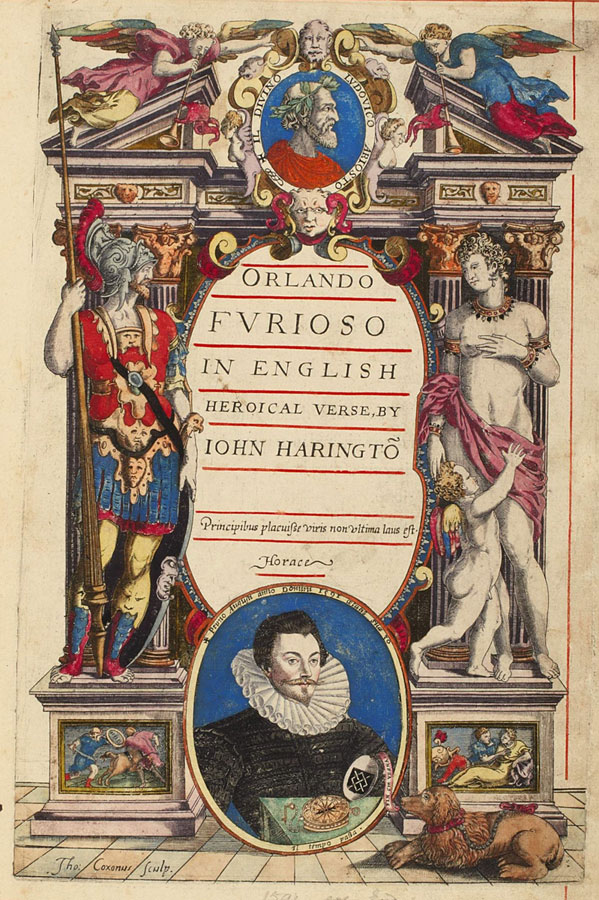Henslowe writes: R at orlando the 21 of febreary ... xvjs vjdYes, Henslowe wrote the date wrong again today; by 21st he probably meant meant the 22nd. Don't worry, he gets back on track tomorrow...
In modern English: Received at Orlando the [22nd] of February, 16 shillings and sixpence
Anyway, on this day 424 years ago, the audience at the Rose saw Robert Greene's play The History of Orlando Furioso, One of the Twelve Peers of France. This is the only performance of Orlando that Henslowe will record in his diary; it may have been an old play that was being phased out because it was no longer profitable.
 | |
| Sir John Harington's 1591 translation of Ariosto |
The play also survives in a much rarer form. Edward Alleyn's 'part' for the role of Orlando is miraculously preserved at the Dulwich College archives. An actor's 'part' was the scroll on which was written the lines of his character, with cues indicated; from this scroll, the actor learned his lines. No other such parts have survived from the Elizabethan theatre, so this document is extremely valuable to theatre historians. You can read more about the part here, and can explore an online facsimile here.
The story
 |
| Angelica and Medor writing love poetry on trees (by Jacques Blanchard, 1630s). In Ariosto's poem, this really happens; in Greene's play, Orlando is tricked into believing it has happened. |
Various comic and violent adventures ensue as the mad Orlando kills a rival and beats up a clown disguised as Angelica. Eventually, Orlando's madness is cured by a witch, and he learns that Angelica is innocent and alive. Due to the slanders on her name, Angelica is being tried for adultery by the Twelve Peers of France, but Orlando saves the day by fighting as her champion in disguise, and he and Angelica are reunited. And so, in the play's final lines, Orlando announces to the French lords that they will all return to France:
Thus, lordings, when our banquetings be done,
And Orlando espousèd to Angelica,
We'll furrow through the moving ocean,
And cheerly frolic with great Charlemagne.
Greene seems to have liked a good frolic at the end of a play; you may recall King Henry encouraging the crowned heads of Europe to frolic at the end of his Friar Bacon and Friar Bungay.
If you would like to read Orlando Furioso, here is an online transcript of Alexander Dyce's 1861 edition. No modern printed editions exist, but there are some old ones available, such as the one in J. Churton Collins' Plays and Poems of Robert Greene (1905).
What we learn from this
Orlando Furioso is almost an amalgam of everything we've seen at the Rose so far. It has the violent battles and the exoticism that we saw in Muly Molocco, combined with the comical and magical spectacle that we saw in Friar Bacon. Perhaps it is the ultimate Rose play?
We're also starting to recognize the typical roles played by Edward Alleyn, the leading actor of Lord Strange's Men. The role of Orlando requires an actor who is larger-than-life and physically powerful while also romantic, and who is able to shift through different psychological states (distinguishing the brave warrior at the beginning of the play from the deranged revenger that he becomes). Alleyn was clearly an actor of many talents and must have been an astonishing stage presence in this role. What will he play tomorrow? Wait and see...
By the way, if you experienced déjà vu when you read about love poems being hung on trees to fool Orlando, it may be because of Shakespeare's As You Like It, in which a lover named Orlando defaces trees with his poetry (watch the young Laurence Oliver doing so in the 1936 film below). This is presumably Shakespeare's little joke, and it's a reminder that Orlando Furioso, though forgotten in our own time, was a familiar part of the theatrical world that Shakespeare and his audience lived and breathed.
FURTHER READING
Orlando Furioso information
- J. Churton Collins, The Plays and Poems of Robert Greene, vol. 1 (Clarendon Press, 1905), 215-19.
- R.A. Foakes, "The 'Part' of Orlando in Robert Greene's Play Orlando Furioso". The Henslowe-Alleyn Digitisation Project (2005).
- Martin Wiggins, British Drama, 1533-1642: A Catalogue, vol. 3 (Oxford University Press, 2013), entry 876.
- Sally-Beth MacLean and Lawrence Manley, Lord Strange's Men and their Plays (Yale University Press, 2014), 90-3.
Henslowe links
- Transcript of this page of the Diary (from W.W. Greg's 1904 edition)
- Facsimile of this page of the Diary (from the Henslowe-Alleyn Digitisation Project)
Comments?
Did I make a mistake? Do you have a question? Have you anything to add? Please post a comment below!
No comments:
Post a Comment